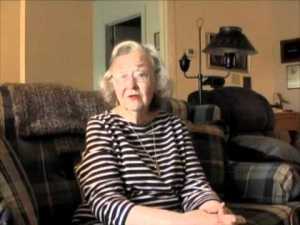On a cold spring night in 1988, I was pulled up in a rocking chair next to a cast-iron kerosene heater, warming myself as a middle-aged North Carolina dulcimer player sang traditional Appalachian ballads.
I was 28 years old and working as a cook at Le Conte Lodge, a hiking lodge in the Great Smoky Mountains National Park. Betty Smith, the ballad singer, had hiked up with a group of North Carolina teachers, who were gathered on a retreat. She’d brought her dulcimer up on her back, and she had invited the lodge crew to attend the after-dinner concert. I was the only one of the eight of us to take her up on the offer.
Doing so would change my life, for that night – as Betty sang old songs like “Barbry Ellen” and “Two Sisters” – I began a love affair with all things Appalachian. Her clear and ringing voice, the stories that twined out from the songs’ lyrics, the mournful and plaintive chords of the dulcimer . . . all brought to life something in me that lives still. More than twenty-five years later, I am still in love with all things Appalachian.
That summer would also bring my discovery of Lee Smith’s novels (Oral History and Fair and Tender Ladies
being my favorites) and my exploration of my family’s Cherokee roots (complete with attendance at Unto These Hills, the outdoor drama about the Trail of Tears). I can still call to mind sitting on my cabin porch, immersed in Lee’s words, and I can remember the foggy, foggy night I drove back with my mom and sister over Newfound Gap Road, just having seen Unto These Hills.
But nothing is so sweet in my memory as the echoes of Betty’s ballad singing that cold April night.
Ten years later, Betty and I would reconnect at the Appalachian Writers’ Workshop held at the Hindman Settlement School in Hindman, Kentucky, and I’d spend night after night learning the old songs from her. Something about “Two Sisters” called to me deeply, and by the time Betty and I met again I’d begun teaching Appalachian Studies and had taught multiple versions of “Barbry Ellen” to my students. Still later, Betty would come to Shepherd University and perform as part of our Appalachian Heritage Festival, which I co-founded with Rachael Meads.
Perhaps best of all, Betty has researched and helped to preserve the legacy of Jane Hicks Gentry. Gentry (1863-1925) lived in the mountains of western North Carolina and was part of the famous Hicks and Harmons families – still known for their preservation of traditional Appalachian stories and songs. Gentry, just by herself, passed along 71 songs to British “songcatcher,” Cecil Sharp, and his assistant, Maud Karpeles, when they came to the Appalachian mountains to write down all the songs they could find. Among the songs Gentry sang for Sharp and Karpeles were “Barbry Ellen” and “The Two Sisters.” You can read all about Jane Hicks Gentry and her rich family tradition of storytelling and ballad singing in Betty’s 1998 book, Jane Hicks Gentry: A Singer Among Singers.
For a phenomenal introduction to these and other “Child” ballads, visit Bluegrass Messengers. Read about “Barbry Ellen” and “The Twa Sisters.” Listen to a great recording of legendary folk singer Jean Ritchie singing “Barbry Ellen,” and listen to Jerry Garcia and David Grisman’s version of “The Two Sisters” (“Dreadful Wind and Rain”). (If you like the Garcia/Grisman recording, you’ll love the album from which it comes: Shady Grove. My husband, Jim, and I play this CD a lot in our house!)
I’m still proud to call Betty my friend, but perhaps even more than that, these old ballads are our friends – these story-songs preserved and passed down by many generations of Appalachians, especially Appalachian women.
Join me this week on Pinterest as I pin images and resources related to Betty Smith and Appalachian ballads. Take a look around at all my boards – or go straight to “My Favorite Songs” board for all things ballad.
And don’t forget to leave a comment on this post! If you subscribe to the weekly StoryWeb email and leave a comment here, you’ll be entered into a monthly drawing to win a StoryWeb T-shirt.
Podcast: Play in new window | Download
Subscribe to StoryWeb in iTunes.Listen to the podcast in Stitcher.
Image credit: This still is taken from the YouTube video of Betty Smith talking about the significance of ballads.
